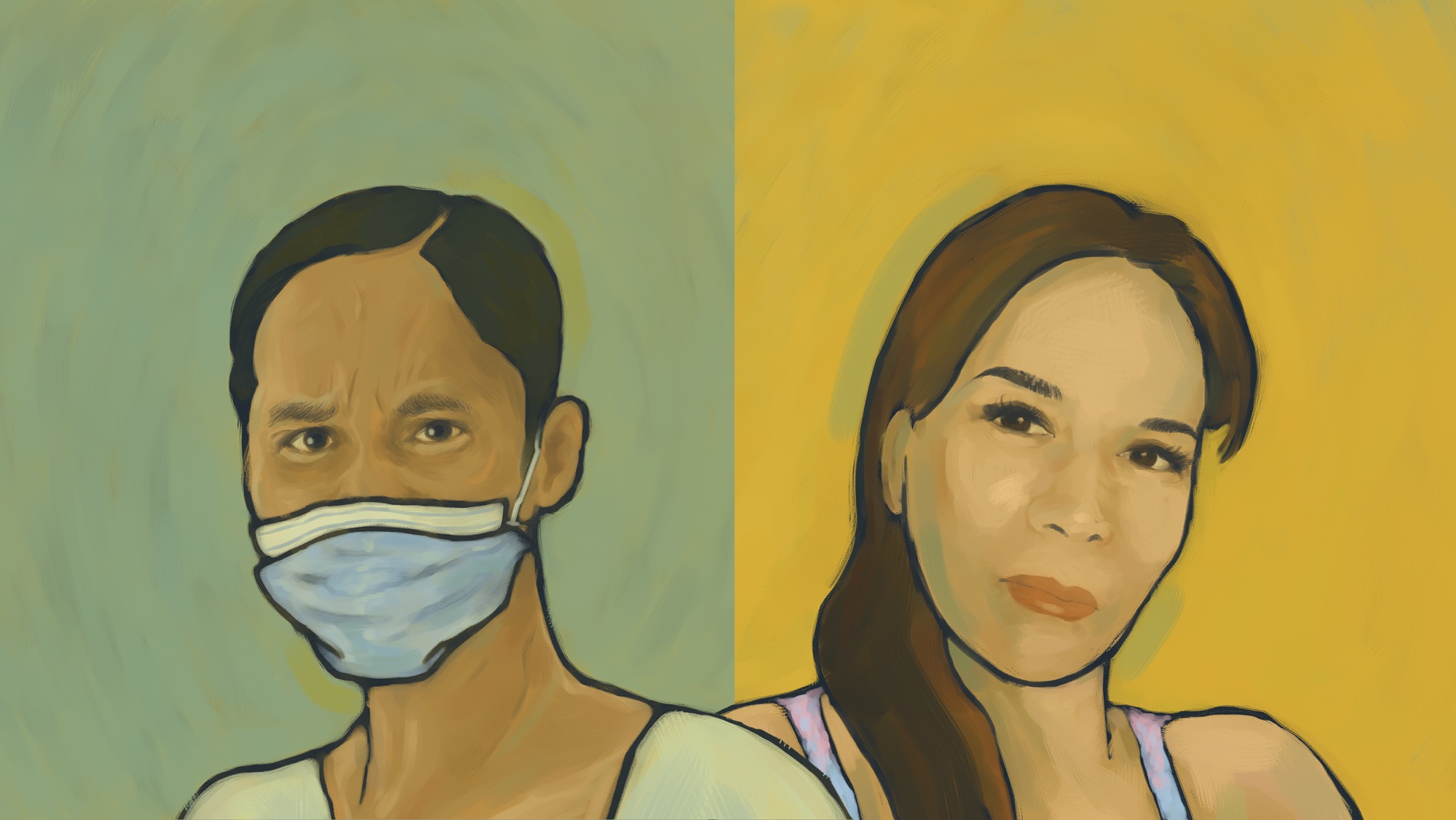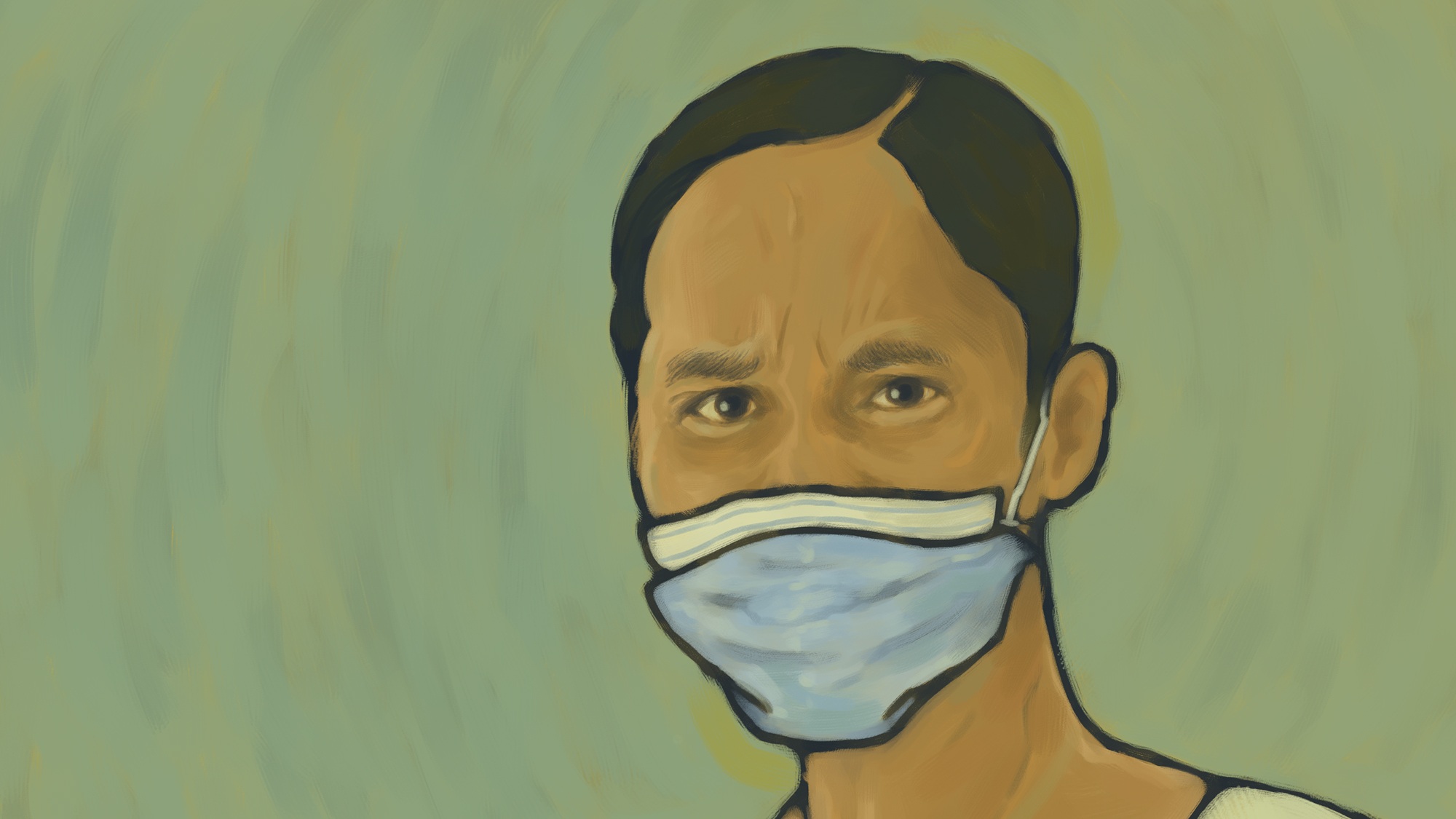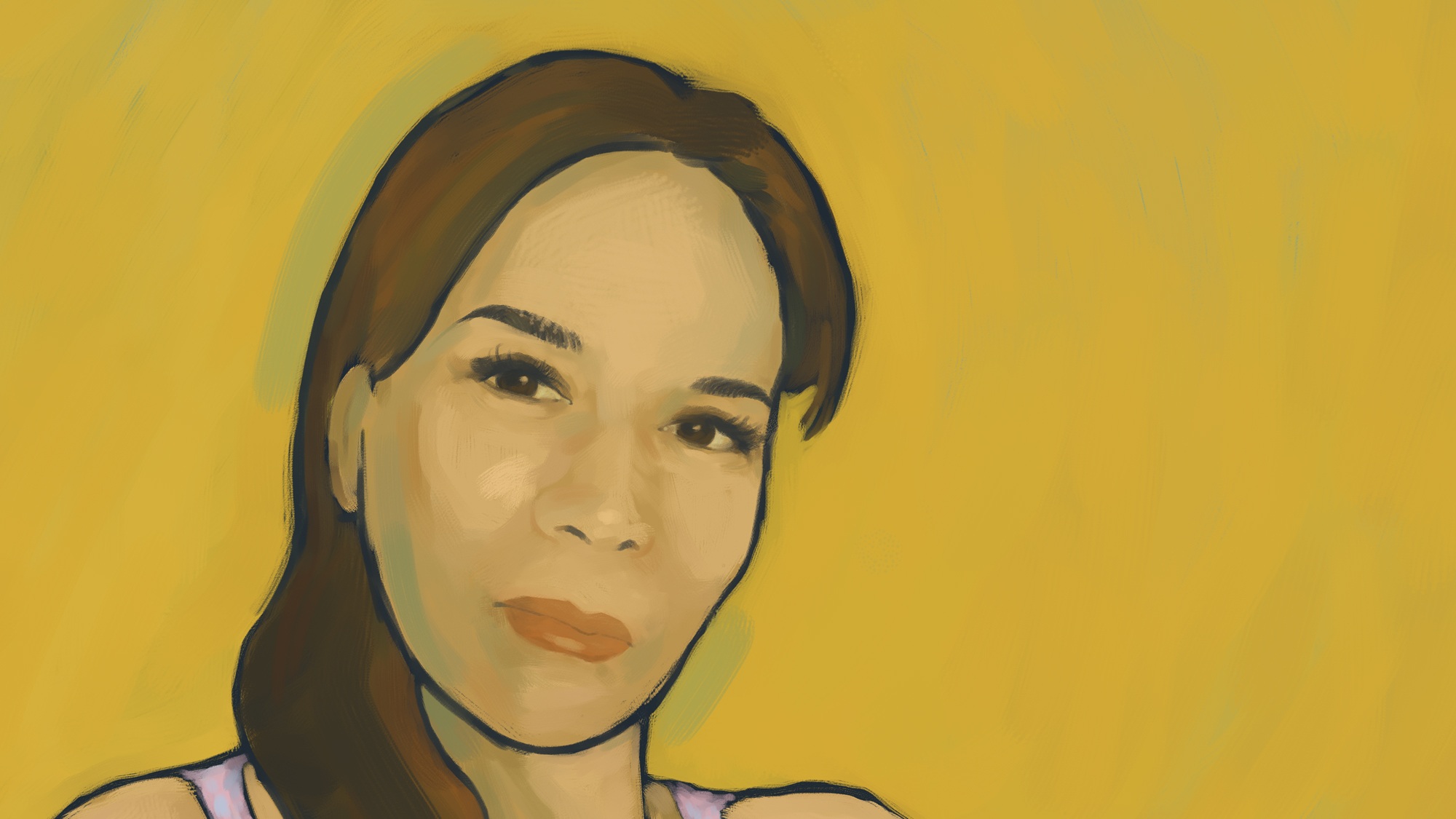By Aie Balagtas See
Philippine Center for Investigative Journalism

Marites Asis and Barbara Ruth Angeles, illustrated by Alexandra Paredes.
Two mothers share how it feels to be prisoners of misery. On top of the uncertainties brought by the Covid-19 pandemic, Marites Asis agonizes over how the justice system has treated her daughter and her late granddaughter, baby River, while Barbara Ruth Angeles has to endure the loss of a daughter to sickness while seeking justice for her son, who’s been in jail for months.
The wheels of justice are grinding exceedingly slow for Marites Asis and Barbara Ruth Angeles.
Marites is the mother of Reina Mae “Ina” Nasino, an urban poor leader who was arrested in Manila in November 2019. Ina learned she was pregnant weeks before her transfer to Manila City Jail and gave birth to baby River on July 1, only to be separated from her newborn after a month.
Marites became worried not only over Ina’s freedom and safety, but also over baby River’s health. River, who was dependent on formula milk and donations from the milk bank, was confined at the Philippine General Hospital after contracting pneumonia in September. Baby River’s death sparked public outrage as Ina was not allowed to visit the hospital and was given only six hours to say goodbye to her baby.
Painter Barbara Ruth Angeles has a similar story. It’s been months since she last saw her son Inno, who was arrested on what she said were trumped-up drug charges in Quezon City in 2018. To add to her misery, Inno’s older and only sister died of bladder problems in August.
Inno was not able to say goodbye.
Barbara Ruth has yet to properly mourn the sudden passing of her eldest child as she is busy earning a living while finding ways to free Inno. Barbara Ruth is also busy taking care of her 12-year-old granddaughter, who is now an orphan.
Marites and Barbara Ruth are free but mired in misery that could only be cured by the delivery of justice.
Here are their stories, in their own words.
Justice is heavy handed for Reina Mae Nasino and baby River
By Marites Asis (as told to Aie Balagtas See)

Marites Asis, illustrated by Alexandra Paredes.
I found out that my daughter Ina was pregnant the same time Covid-19 struck. I felt the weight of heaven crash down on me.
I couldn’t give an interview without crying. At night, I even cry myself to sleep. You’d think I was crazy.
I learned about my daughter’s pregnancy in February, a few weeks before the police were set to transfer her to Manila City Jail.
That’s why when lockdowns were imposed, I was anxious. You need social distancing, but they’re cramped in a dormitory that houses 111 people.
It seemed risky for my daughter to be pregnant and at the same time detained in jail, where she could catch the virus.
I was asleep when Ina was arrested [on Nov. 5, 2019]. Someone went to my house at about 5 a.m. and told me about Ina’s arrest. The person said she was taken to the CIDG (Criminal Investigation and Detection Group) office in Manila Police District (MPD). In short, I rushed to MPD around 5 a.m.
I was hysterical.
I went to Ate Vicky, my older sister, the woman who raised all of us, including Ina. We consider her our mother.
Ate Vicky said we should go to MPD. At MPD headquarters, however, they did not allow us to see Ina immediately.
Investigators were asking them if they really owned those guns.
I was furious.
The police planted evidence against Ina. I know my daughter. They planted guns and grenades. During the arrest, the cops covered their faces with pillows. Who in his right mind would do that to our youth?
It hurts so much to see your child in jail.
You couldn’t even go out because of coronavirus. You’re stuck at home. Anxious and worried.
Before coronavirus hit, I would visit her in jail every day. I never missed a visit until visitation rights were cancelled last March.
With the lockdown in place, I felt helpless.
I always wonder how my daughter is doing. Is she eating well? Can she take a shower in private or do they take showers in groups?
I pity my daughter.
Because of the virus, we could not see each other, especially when she was still pregnant. Covid-19 exacerbated my pain.
She said maybe I could see her again in October.
It’s difficult. It’s really, really difficult. I couldn’t sleep at night. I would always think of her. She would talk to us through video calls, and we were happy to see her tummy grow.
But I felt so guilty. I couldn’t take care of my own daughter.
Ina was supposed to give birth on July 10 but she gave birth nine days early, on July 1.
I didn’t even see her at the hospital.
I was asleep. A jail personnel called me at midnight. She instructed me to go to Fabella Hospital as Ina was about to give birth.
I rushed to Ate Vicky once again. Together we went to Fabella, hoping we could be by my daughter’s side on that important day.
When we got there, the hospital administration said visitors were not allowed because of their Covid-19 protocols.
Anyway, the hospital said Ina had given birth.
Ate Vicky and I went back to Fabella on July 3 to bring diapers and water for the baby.
The security guards said my daughter was still there. They didn’t allow us to see her, so we asked if they could hand the package over to Ina.
On our way home, about noontime, Ate Vicky’s phone rang. It was Ina. She said the baby was crying because she could not produce milk. The baby was hungry.
It baffled us because we thought she was still in the hospital. Ina said they returned to jail on July 2.
No one told us. We just found out. That gave us another bout of sharp pain.
The security guards played us for fools!
We attended to Ina first. When we reached the city jail, we were told the baby was already given formula milk.
Then we stormed Fabella Hospital to confront the guards. We demanded that they return the diapers and water. Those belong to us.
They didn’t even want to return the water and diapers, so I complained at the hospital’s information center.
I last saw Ina when she handed the baby to us on [Aug. 13].
We barely met her. We were not supposed to see Ina. I just asked the warden if I could have a glimpse of my daughter.
How do I feel? I’m filled with pain. I can witness the suffering of my child.
I felt that Ina and my granddaughter did not want to be separated from each other.
How I feel about Ina is the same with how she feels about my granddaughter.
I don’t know why they treated her that way. As a mother, I felt hurt. I don’t know how to explain it. She is not convicted yet.
It was painful to watch them [policemen and jail guards] surround my daughter. It’s okay if they made her wear PPE (personal protective equipment) because she needed to go back to jail. But to handcuff her? As if it’s not a wake.
I have yet to move on.
I skip social media posts that remind me of what happened because they bring back memories of when she was handcuffed at the wake. She was looking at her child. She was not able to come close to her infant’s coffin.
Then there’s the memory of men with high-powered guns barging in to inspect the room and the toilet because they were afraid of getting outfoxed.
You see? They did not give us the chance to bond.
That day, I ran out of tears to cry. All I could do was call them out.
I didn’t have any tears left to cry after seeing my daughter’s situation.
It was difficult to cry because I was enraged. I asked them to leave the room because we didn’t need guns there.
They didn’t have to guard the burial. There were so many of them that they outnumbered the mourners.
I tried to appeal to their hearts. I told them we knew it was an order and we couldn’t do anything. Just the same I hoped they realized it was a burial and a mother would be separated from her child.
I only wish they had thought of that.
During our last conversation at the cemetery, Ina told me: “Ma, it’s okay to put the baby inside the niche.”
Ina held my hand twice: during the wake and during the burial.
She told me: “Ma, give me your hand.” She held it tight.
She was trying to tell me that I needed to be strong. I told her: “Be strong, we will fight back.”
Postscript:
I’m okay. But it’s not easy to forget because the trauma is still there. I can go to work now.
Ina said it’s not yet the end of everything.
I filed a legal complaint over what they did during the baby’s wake and burial. How will I attain justice if I don’t complain? This should serve them a lesson because they must not treat other people the way they treated us.
Baby River died of pneumonia on Oct. 9. The court gave Reina Mae a couple of three-hour furloughs to bid her child goodbye. The first was to visit the wake, the second was to bury her child.
Not even an inch of her skin was able to touch River’s coffin. She was made to wear a full hazmat suit during the visits because of the threat of Covid-19. She was in handcuffs most of the time and was surrounded by heavily armed government forces.
Their family was never given a chance to grieve.
Legal shortcuts in the drug war: From ‘palit-ulo’ to ‘amin-laya’
By Barbara Ruth Angeles (as told to Aie Balagtas See)

Barbara Ruth Angeles, illustrated by Alexandra Paredes.
My son Inno will enter into a plea-bargain agreement. I don’t have any choice left. I have to take him out of jail.
My son does not want it, but I have no choice. How else are we going to set him free? That was why we opted for “amin-laya” (plea bargain).
The advice came from lawyers and BJMP (Bureau of Jail Management and Penology) personnel. They said it’s his first offense anyway.
I’m worried for my son, of course, as entering into a plea bargain means having a permanent criminal record. It’s similar to being convicted already, although he is innocent.
But my son’s case has been pending in court for two years. Within that period we only had about four hearings even if the court had released a monthly schedule.
Reset. Reset. Reset.
Since my son couldn’t prove his innocence in court, I told him that once he’s free, it’s up to him to prove to himself that he’s not what the government had accused him of.
Besides, the cops offered this solution to us before, and they promised us they wouldn’t oppose it.
I can take better care of my son if he’s with me. I can tell him, “Don’t go out, don’t go with these people.”
I just want this problem to end. We’re all suffering because of it.
Then, there’s the pandemic. The BJMP does not tell us the exact number of inmates infected with Covid-19. It’s difficult because it’s congested there.
Actually, I had to take risks and buy my son a P15,000 kubol (hut) so he could have his own space, and that’s just plywood about a quarter of a meter in size.
It is very expensive inside city jails. You’re aware of this: If you are poor, you will starve to death inside our jails.
Since visitation rights are suspended, my son and I communicate with each other through phone calls. Imagine this: to get in touch with me, he needs to buy call cards worth P100 for P300. The BJMP asks you to buy the call cards from them.
I won’t tell you the exact amount that I spend on my son but his budget for a week is my budget for two weeks.
I don’t know what else could happen. That’s why I said, “Son, just plead guilty.”
My son was arrested on May 3 (2018). Arrests of drug suspects spiked during that period because of the drug war “quota”. I learned about that so-called quota from the BJMP personnel. They blamed it for their population boom.
Go back to the day Galas police station was raided over an extortion case. That’s how we learned Inno was there.
At first, we had no idea that Inno had been arrested. We looked for him in barangay halls and police stations. We reported him as missing because we couldn’t reach his phone.
I kept crying.
My daughter and I searched everywhere. I thought he was killed because deaths related to bike theft were rampant those days, so we scoured hospitals and funeral parlors.
I posted about our search for Inno on Facebook. One of my school batchmates advised me to report it to 8888. I reported it to the Duterte hotline 8888 but it was not able to help us.
On May 4, Galas Police Station was raided over an extortion case involving its anti-narcotics team.
A police investigator called me and said: “Go to Galas Police Station immediately. Your son is here. Bring food and clothes.”
I was shocked. How did he end up there?
No one entertained me at the police station until I lost my cool.
Someone from GMA News told me to get a good lawyer.
At that time, hiring a private lawyer cost P300,000. Our case got delayed because we couldn’t find one. Some were too old. His grandmother found someone but I think he’s from Aklan.
We couldn’t grasp what was happening. We were desperate to find a lawyer. It was mental torture. We weren’t used to this. It was the first time someone in the family got involved in a court case.
The most enraging part was my son didn’t violate any law.
You know, initially, the police didn’t even have a record of his arrest.
I talked to detainees and some policemen at Galas. I learned that the SAID (Station Anti-Illegal Drugs Division) cops were supposed to kill Inno as a replacement for big fish that they’re extorting money from.
The policemen in Galas said my son was intended for “palit-ulo.” (Palit-ulo, which literally means head-swapping, is a scheme in which a drug suspect gets freedom in exchange for ratting out on his or her suppliers.)
They said it was for a “zero-zero.” You know zero-zero?
That meant they would kill him.
The policemen tortured my son.
I have evidence, including the medico-legal report, and X-ray and CT scan results.
At the hospital, the doctor said he had fractured ribs. They also saw a “metallic forensic” in his left leg.
The doctor did not want him to leave, but Galas police did not allow him to be operated on. Despite his fractures and injuries, Galas turned him over to the city jail.
We lost the chance to have him treated. His wounds eventually healed in jail.
You asked how I’m doing?
It’s the first time someone asked me that question.
Well, I’m not… I’m not okay. I try to do my normal routine but emotionally, no, I’m not okay. My daughter died in August while my son is in jail. She’s my eldest and the only one I could rely on to deal with this problem.
We were able to get hold of the CCTV [showing Inno’s illegal arrest] because of her.
I still couldn’t accept that my daughter had passed away.
Inno was not able to say goodbye. They had not seen each other for two years.
She was sick but was not confined. Her resistance was down and I was afraid that she might catch the virus in the hospital.
My daughter left behind three children. The eldest child, an 11-year-old girl, does not have a father. I’m taking care of her.
My granddaughter is already worried that her life will fall apart if something happens to me. I told her, nothing’s going to happen to me because I still have a purpose in life.
I have faith in the Lord.
I never questioned God for everything that I’m going through. I know he will not give me these trials if I cannot overcome them.
I’m trying to be strong for my son and for my granddaughter. If I falter, who would be strong for them?
But it’s difficult.
Postscript:
I think my daughter is guiding me. I feel better now. I started painting again 40 days after her death.
I used to paint with dark colors, colors that you can associate with death. This time, I’m using positive and vibrant colors. My artwork seems alive.
Do I have peace of mind?
No. I can only have peace of mind when my son is finally with me. –PCIJ, December 2020
Aie Balagtas See is a freelance journalist working on human rights issues. Follow her on Twitter (@AieBalagtasSee) or email her at aie.bsee@gmail.com for comments.
Inspired by The Marshall Project’s Life Inside, Marites’ and Barbara’s stories are part of PCIJ’s series on the criminal justice system, which includes first-person accounts from current and former detainees and their family members.